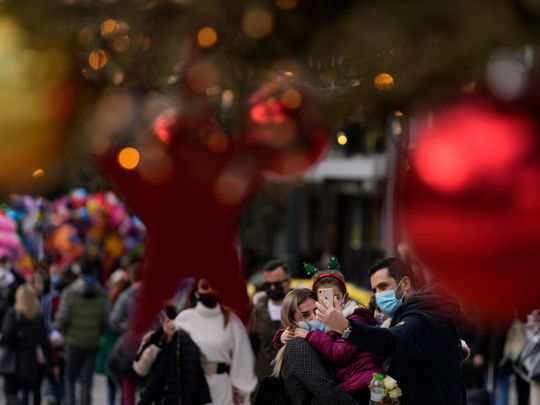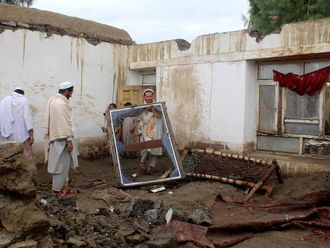
Paris: The number of daily new COVID-19 cases worldwide has crossed one million for the first time since the pandemic began two years ago, according to an AFP tally on Thursday.
The figures for 23-29 December, the highest since the virus first emerged at the end of 2019, are based on tolls given daily by health authorities in each country.
More than 7.3 million new COVID-19 cases were detected around the world in the last seven days — an average of 1,045,000 infections every day — following a surge in cases of the highly contagious Omicron variant.
The numbers are much higher than the last record before the current wave when daily cases stood at 817,000 on average between April 23 and 29.
A large share of the less serious or asymptomatic cases remain undetected despite ramped up testing in many countries since the pandemic began.
Also, testing policy varies from one country to another.
In France, wearing masks outdoors will be compulsory while walking the streets of Paris from Friday for everyone over the age of 11. Nightclubs have been closed until well into January.
In Spain, public festivities have been cancelled across most regions and in the biggest cities except Madrid, where a stripped-down gathering is scheduled with the crowd limited to 7,000 people compared to 18,000 in 2019 before the pandemic swept Europe.
On Thursday, Britain’s National Health Service announced that it would start opening temporary field hospitals to contain a possible overspill of inpatients in England, where the government stopped short of mandating curbs on New Year festivities.
‘War footing’
“Given the high level of COVID-19 infections and increasing hospital admissions, the NHS is now on a war footing,” National Medical Director Stephen Powis said.
Indonesia, which has reported more than 4.2 million confirmed cases, warned that foreign travellers may be deported from the resort island of Bali if they are caught violating Covid health rules during New Year.
“Get ready to be kicked out,” Bali immigration office head Jamaruli Manihuruk told AFP. Bali has barred carnivals, fireworks and gatherings of more than 50 people over the Christmas and New Year period.
Mexico City has also cancelled its massive New Year’s Eve celebrations as a preventative measure after a rise in Covid cases.
“I feel that this casts doubt on a lot of what we thought was already secure, because it is scary, it is worrying,” said Aaron Rosas, an engineering student.
“By doing that cancellation they are sending a message in a way: ‘You know what? This is serious’,” said teacher Victor Arturo Madrid Contreras.
In Saudi Arabia, authorities reimposed social distancing measures at the Grand Mosque in the Muslim holy city of Mecca, after recording the highest number of infections in months.
“I am highly concerned that Omicron, being more transmissible, circulating at the same time as Delta, is leading to a tsunami of cases,” said WHO chief Tedros Adhanom Ghebreyesus.
‘Brink of collapse’
“This is and will continue to put immense pressure on exhausted health workers, and health systems on the brink of collapse.”
Omicron has already started to overwhelm some hospitals in the United States, the hardest-hit country, where the seven-day average of new cases has hit 265,427, according to a Johns Hopkins University tracker.
Harvard epidemiologist and immunologist Michael Mina tweeted that the count was likely just the “tip of the iceberg” with the true number likely far higher because of a shortage of tests.
“Half of my family has it,” said Victoria Sierralta at a testing site in Miami. “It’s like we’re back in like the first stage of Covid. It’s absolutely crazy.”
The NBA, NFL and NHL are scrambling to keep teams competing and sports leagues are grappling with how best to adjust their coronavirus protocols to protect players, staff and fans while keeping their schedules intact.
In China, residents in the city of Xi’an, where 13 million people are under lockdown, said they were struggling to find enough food, despite Beijing insisting that there were adequate supplies.
State TV showed footage of workers in hazmat suits sorting eggs, meat and vegetables, before delivering food to residents door-to-door.
“I live on.... a bowl of porridge every day, just to keep alive,” one resident surnamed Wang told AFP, saying she was working through all her supplies.Global infections worldwide - on the rise since the middle of October - shot up by 44 per cent the previous week over a week earlier.
A COVID “tsunami” threatens to overwhelm healthcare systems, the World Health Organization warned on Wednesday.
“This is and will continue to put immense pressure on exhausted health workers, and health systems on the brink of collapse,” WHO chief Tedros Adhanom Ghebreyesus said.
More than 85 pe rcent of the new infections occurred in two regions worst hit by Omicron - Europe, which recorded 4,022,000 cases in the last seven days, up 36 per cent over the preceding week, and the United States and Canada which had a combined 2,264,000 cases in the same period, up 83 per cent.
However Asia saw 268,000 cases, or a 12 per cent drop.
Covid deaths worldwide have continued to decline for three weeks now with 6,400 in the past week - a fall of six percent over the previous week.
A record 14,800 daily deaths were registered between January 20 and 26.












